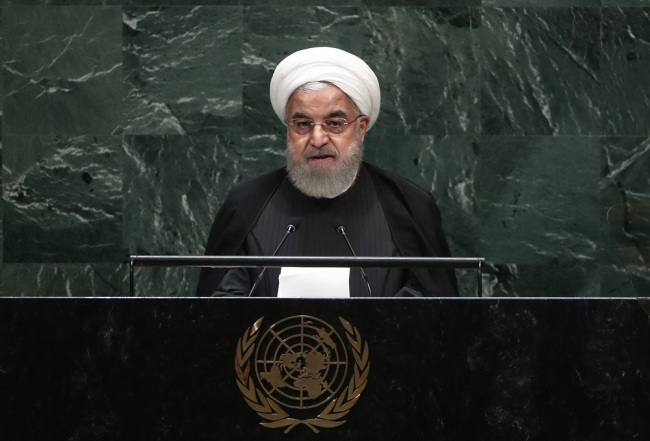Iranian President Hassan Rouhani on Wednesday ruled out negotiations with the United States unless the latter lifts sanctions on his country first.
“On behalf of my nation and state, I would like to announce that our response to any negotiation under sanctions is negative,” Rouhani told the UN General Assembly General Debate.
The government and people of Iran have remained steadfast against the harsher sanctions in the past one and a half years, and will never negotiate with an enemy that seeks to make Iran surrender with the weapon of poverty, pressure, and sanctions, he said.
“It has now become clear for all that the United States turns (its) back on its commitments, and Europe is unable and incapable of fulfilling its commitments. We … remain committed to our promises in the deal. However, our patience has a limit,” said Rouhani, referring to an international agreement on his country’s nuclear program.
Britain, China, France, Germany, Russia and the United States struck a deal with Iran in July 2015, which was immediately endorsed by UN Security Council Resolution 2231. However, the United States withdrew from it in May 2018 and re-imposed sanctions on Iran, prompting Tehran’s reversal of its commitments.
When the United States does not respect the UN Security Council resolutions, and when Europe displays inability, the only way shall be to rely on Iran’s national dignity, pride and strength, said Rouhani. “They call us to negotiations while they run away from treaties and deals.”
“If you require a positive answer, … the only way for talks to begin is to return to commitments and compliance,” said the Iranian leader. “If you are sensitive to the name of JCPOA (Joint Comprehensive Plan of Action, the official name of the Iran nuclear deal) well, then you can return to its framework and abide by UN Security Council Resolution 2231. Stop the sanctions, so as to open the way for the start of negotiations.”
“I would like to make it crystal clear: if you are satisfied with the minimums, we will also convince ourselves with the minimums — either for you or for us, the JCPOA was a minimum for you and for us. However, if you wish more, if you require more, you should also give and pay more.”
Rouhani’s resounding “No” on Wednesday dampened the hope of a meeting between him and U.S. President Donald Trump. The opportunity offered by the presence of both leaders in New York for the UN General Assembly triggered diplomacy by other leaders in a bid to broker such a meeting.
French President Emmanuel Macron was an active player in the past few weeks. He told Rouhani on Tuesday that not meeting Trump would be “a lost opportunity” as Trump may not travel to Tehran to meet him. He later said the conditions for such a meeting were in place.
In his speech to the General Debate of the UN General Assembly on Tuesday, Macron said the time has come to resume negotiations between the United States, Iran, and world and regional powers.
Pakistani Prime Minister Imran Khan said Tuesday that Trump asked him for help on Monday before Khan’s meeting with Rouhani. Khan conveyed Trump’s message but Rouhani’s response on Wednesday said it all.
Tensions between Iran and the United States grew substantially after the Sept. 14 attack on Saudi oil facilities.
The United States blames Iran for the attack although the Houthi rebels in Yemen have claimed responsibility. Iran denies any involvement.
Iran’s President Hassan Rouhani speaks at the 74th session of the UN General Assembly at the headquarters of the United Nations in Manhattan. [Cover Image: TASS via IC/Valery Sharifulin]


